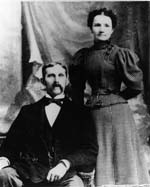16 Feb. 1860–7 Dec. 1945

Julia Elizabeth Westall Wolfe, mother of Thomas Wolfe, was born on a farm near the Swannanoa River nine miles east of Asheville. She was the fourth of eleven children (Henry Addison, Sam, Sally, Julia Elizabeth, James M., William Harrison, Lee, Mary, Crockett, Elmer, and Greely) born to Martha Anne Penland and Thomas Casey Westall, a farmer and builder. On both sides she was descended from pioneer families of western North Carolina. Educated at Judson College in Hendersonville, she taught school for a time but gave it up to marry William Oliver Wolfe on 14 Jan. 1885.
The couple resided in Asheville, where their eight children were born: Leslie, 1885–86; Effie Nelson (Gambrell), 1887–1950; Frank C., 1888–1956; Mabel (Wheaton), 1890–1958; twins Grover Cleveland, 1892–1904, and Benjamin Cleveland, 1892–1918; Frederick William, 1894–1980; and Thomas Clayton, 1900–1938. In 1906 Mrs. Wolfe bought for $6,500 a boardinghouse at 48 Spruce Street, which she operated until her death. Called the Old Kentucky Home by the former owner, it was the Dixieland of Look Homeward, Angel and Of Time and the River. Purchased by the state of North Carolina in 1975 as a historic site, it was then opened to the public as the Thomas Wolfe Memorial.
In his novels Wolfe provided a largely autobiographical account of the family's life from the turn of the century on. Julia Wolfe became the fictional Eliza Gant, a small, compact, and persevering woman, determined to keep her family together and manage her boardinghouse in spite of marital discord and tragedies such as the deaths of Grover and Ben. An able talker with a remarkable memory, she provided her son with much raw material for his novels and short stories. Her talents in business, not only in running the boardinghouse but also in real estate purchases and sales, led to the family's relative affluence; thus Thomas was able to attend a private preparatory school and The University of North Carolina.
After her husband's death Mrs. Wolfe continued her business interests and was able to provide financial aid for her son, then teaching at New York University and traveling in Europe. When she lost much of her capital in the Florida real estate crash of the 1920s, which was followed by the 1930s depression in Asheville, she had to depend mainly on the Old Kentucky Home for income. As her son's books became famous, she in turn became noted as the real-life matriarch of the fictional Gants. From the early 1930s onward, her boardinghouse drew literary pilgrims to Asheville.
A close bond existed between Mrs. Wolfe and her son Thomas from childhood until his death, and some commentators have traced similar traits of character, such as a prodigious memory, ambition, verbal power, and determination. Their correspondence, which spanned thirty years, illumines one of the most moving mother-son relationships in American literary history. Always a champion of her son's writing, Mrs. Wolfe became ever more so after his death. Often she traveled to various parts of the country giving informal talks on his early life and influences. Spry, agile, and talkative to the last, she died in New York City while on one of these trips. She was buried in the family plot at Asheville's Riverside Cemetery. Mrs. Wolfe was a Presbyterian and a Democrat.